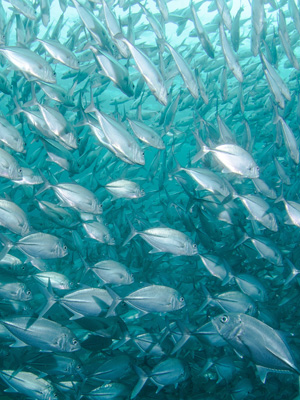How are rising sea temperatures stunting fish growth?
Research news
Deakin’s new Australian Research Council Future Fellow Dr Timothy Clark is set to investigate one of the most profound issues facing global fish populations.
Eco-physiologist and Future Fellow Dr Timothy Clark is preparing to explore why fish species and other aquatic organisms are becoming less able to achieve large sizes in the face of rising sea temperatures.
Dr Clark hopes to address the international call to uncover the mechanisms underlying the “temperature-size rule” phenomenon, in order to benefit both wild and cultured fish stock.
“The experiences that I’ve had around the world, along with understanding how much of a ubiquitous problem this is on a global scale, got me interested in doing this research,” he said.
Dr Clark says the issue has caused arguments within fishery and marine science communities, but there is a lack of evidence to draw on.
“There’s significant debate in the literature at the moment about what causes this, but we lack the necessary data to solve the problem. I’m looking to fill these gaps so we can reach a resolution to these arguments and then consider the next steps. The research will guide policy and management decisions by providing tools that will help future-proof industries reliant on wild and cultured fishes.”
Aquatic systems are increasingly becoming warmer through unprecedented heatwaves, with certain fish species estimated to decrease in size by 25 per cent by 2050.
Existing theories suggest oxygen availability in the water and fish metabolism are reasons why higher temperatures are causing a fish size decrease.
The observed “shrinking” of fishes due to climate warming is predicted to have widespread ramifications for the ecology of aquatic systems, the economics of fisheries and related industries.
“If we’re not getting the same size of individuals, then we are going to have less reproductive output and that’s going to have an effect on fisheries,” said Dr Clark.
Dr Clark is a high-performing, mid-career researcher who joined Deakin in November last year. Based within Deakin’s School of Life and Environmental Sciences, his research is focused on physiological ecology and aquaculture, particularly with regard to the effects of environmental change on aquatic ectothermic animals.
The highly-competitive Future Fellowships scheme supports research in areas of critical national importance by giving outstanding mid-career researchers incentives to conduct their research in Australia. Dr Clark is internationally recognised for his contributions to the fields of animal physiology, global change biology, fisheries and aquaculture. He is one of two Deakin researchers to receive a prestigious Future Fellowship this year and will receive $850,000 to undertake the four-year project.
Dr Clark will draw upon multi-disciplinary expertise to test three competing theories to identify the fundamental processes driving the “shrinking” associated with climate warming.
“I’ll be working with nutritionists, fisheries modellers, geneticists and evolutionary biologists to bring together a whole bunch of different opinions and approaches to disentangle what is going on,” he said.
“Ultimately, we want to understand the mechanisms that are causing fish to decrease in size with global warming so we can refine the parameters in the existing models and forecast what global fisheries will look like in the next century.”
Share this story

